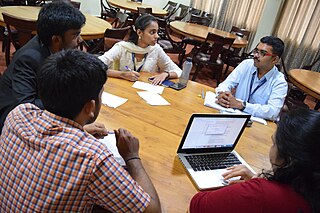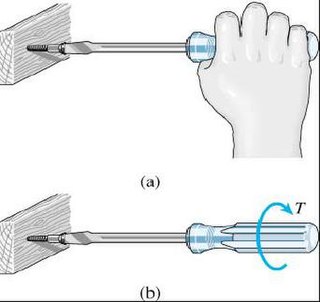Related Research Articles

Microsoft FrontPage is a discontinued WYSIWYG HTML editor and website administration tool from Microsoft for the Microsoft Windows line of operating systems. It was branded as part of the Microsoft Office suite from 1997 to 2003. Microsoft FrontPage has since been replaced by Microsoft Expression Web and SharePoint Designer, which were first released in December 2006 alongside Microsoft Office 2007, but these two products were also discontinued in favor of a web-based version of SharePoint Designer, as those three HTML editors were desktop applications.

A focus group is a group interview involving a small number of demographically similar people. Their reactions to specific researcher-posed questions are studied. Focus groups are used in market research and studies of people's political views. The discussions can be guided or open. They can concern a new product or something else. The idea is for the researcher to learn about the participants' reactions. If group members are representative of a larger population, those reactions can be expected to reflect the views of that larger population. Thus focus groups constitute a research method that researchers organize for the purpose of collecting qualitative data, through interactive and directed discussions.
Questionnaire construction refers to the design of a questionnaire to gather statistically useful information about a given topic. When properly constructed and responsibly administered, questionnaires can provide valuable data about any given subject.
A think-aloudprotocol is a method used to gather data in usability testing in product design and development, in psychology and a range of social sciences.

Usability can be described as the capacity of a system to provide a condition for its users to perform the tasks safely, effectively, and efficiently while enjoying the experience. In software engineering, usability is the degree to which a software can be used by specified consumers to achieve quantified objectives with effectiveness, efficiency, and satisfaction in a quantified context of use.
Messaging Application Programming Interface (MAPI) is an API for Microsoft Windows which allows programs to become email-aware. While MAPI is designed to be independent of the protocol, it is usually used to communicate with Microsoft Exchange Server.

Response bias is a general term for a wide range of tendencies for participants to respond inaccurately or falsely to questions. These biases are prevalent in research involving participant self-report, such as structured interviews or surveys. Response biases can have a large impact on the validity of questionnaires or surveys.

Web conferencing is used as an umbrella term for various types of online conferencing and collaborative services including webinars, webcasts, and web meetings. Sometimes it may be used also in the more narrow sense of the peer-level web meeting context, in an attempt to disambiguate it from the other types known as collaborative sessions. The terminology related to these technologies is exact and agreed relying on the standards for web conferencing but specific organizations practices in usage exist to provide also term usage reference.

In computing, a virtual desktop is a term used with respect to user interfaces, usually within the WIMP paradigm, to describe ways in which the virtual space of a computer's desktop environment is expanded beyond the physical limits of the screen's display area through the use of software. This compensates for a limited desktop area and can also be helpful in reducing clutter. There are two major approaches to expanding the virtual area of the screen. Switchable virtual desktops allow the user to make virtual copies of their desktop view-port and switch between them, with open windows existing on single virtual desktops. Another approach is to expand the size of a single virtual screen beyond the size of the physical viewing device. Typically, scrolling/panning a subsection of the virtual desktop into view is used to navigate an oversized virtual desktop.

C# is a general-purpose, multi-paradigm programming language encompassing static typing, strong typing, lexically scoped, imperative, declarative, functional, generic, object-oriented (class-based), and component-oriented programming disciplines.
In software licensing, a volume licensing is the practice of selling a license authorizing one computer program to be used on a large number of computers or by a large number of users. Customers of such licensing schemes are typically business, governmental or educational institutions, with prices for volume licensing varying depending on the type, quantity and applicable subscription-term. For example, Microsoft software available through volume-licensing programs includes Microsoft Windows and Microsoft Office.
In social science research, social-desirability bias is a type of response bias that is the tendency of survey respondents to answer questions in a manner that will be viewed favorably by others. It can take the form of over-reporting "good behavior" or under-reporting "bad", or undesirable behavior. The tendency poses a serious problem with conducting research with self-reports. This bias interferes with the interpretation of average tendencies as well as individual differences.
A self-report study is a type of survey, questionnaire, or poll in which respondents read the question and select a response by themselves without interference. A self-report is any method which involves asking a participant about their feelings, attitudes, beliefs and so on. Examples of self-reports are questionnaires and interviews; self-reports are often used as a way of gaining participants' responses in observational studies and experiments.

Solitaire is a computer game included with Microsoft Windows, based on a card game of the same name, also known as Klondike.

Microsoft RoundTable was a videoconferencing device with a 360-degree camera that was designed to work with Microsoft Office Communications Server 2007 or Microsoft Office Live Meeting. RoundTable provided remote meeting participants with panoramic video of everyone sitting around the conference table. In addition, RoundTable contained active speaker detection technology that provides high-resolution video of the active speaker in a meeting, and tracked the flow of conversation in real time, switching between different meeting participants as they speak.

Information cards are personal digital identities that people can use online, and the key component of an identity metasystem. Visually, each i-card has a card-shaped picture and a card name associated with it that enable people to organize their digital identities and to easily select one they want to use for any given interaction. The information card metaphor is implemented by identity selectors like Windows CardSpace, DigitalMe or Higgins Identity Selector.
The phrase innovation game refers to a form of primary market research developed by Luke Hohmann where customers play a set of directed games as a means of generating feedback about a product or service. The research is primary because the data collected is gathered directly from customers or prospects and is intended to answer a specific research question. “Customers” who play innovation games are commonly direct recipients or consumers of a specific product or service. In some cases, though, game players may be any person or system who is or would be affected by a product or service.
User experience evaluation (UXE) or user experience assessment (UXA) refers to a collection of methods, skills and tools utilized to uncover how a person perceives a system before, during and after interacting with it. It is non-trivial to assess user experience since user experience is subjective, context-dependent and dynamic over time. For a UXA study to be successful, the researcher has to select the right dimensions, constructs, and methods and target the research for the specific area of interest such as game, transportation, mobile, etc.

Behavioural design is a sub-category of design, which is concerned with how design can shape, or be used to influence human behaviour. All approaches of design for behaviour change acknowledge that artefacts have an important influence on human behaviour and/or behavioural decisions. They strongly draw on theories of behavioural change, including the division into personal, behavioural, and environmental characteristics as drivers for behaviour change. Areas in which design for behaviour change has been most commonly applied include health and wellbeing, sustainability, safety and social context, as well as crime prevention.
Techspardha is the annual techno-managerial festival of National Institute of Technology, Kurukshetra. It started in 1995 as "Technospect". The year 2013 marked the Golden Jubilee of NIT Kurukshetra, thus it was renamed as Techspardha. Etymologically, the word ‘Techspardha’ is composed of two words, ‘Tech’ in English is a contraction of technology and ‘Spardha’ in Hindi means competition. Techspardha is known for hosting a variety of events that include competitions, exhibitions, guest lectures as well as workshops.